How To Find an Ethical Safari or Wilderness Experience
Whether it’s a wildlife watching trip in Africa or a desert dune adventure in the Middle East, here’s how to find an ethical, sustainable safari.
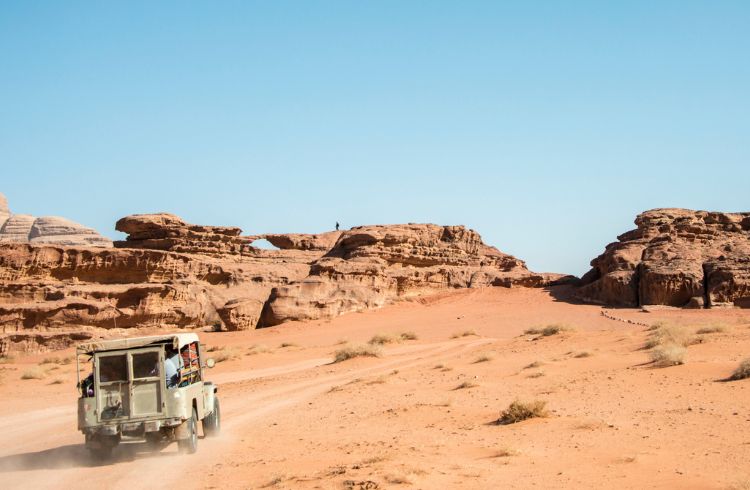 Photo © Getty Images/Paul Biris
Photo © Getty Images/Paul Biris
While African bush experiences may be what most people associate with safaris, you’ll find aquatic safaris in Tanzania, desert safaris in Peru and Jordan, and wildlife-watching safaris right in the United States. Considering the dramatic difference between safari experiences – and operators – it’s worth doing some research to ensure your safari experience is an ethical and sustainable one.
- Research, research, research
- Animal interactions
- Employing local community members
- Expense vs affordability
- Desert safaris
Certainly, the phrase “ethical safari” could be interpreted differently by different people, but we’re looking at it in terms of the sustainability of the camp, who they employ, how much of the safari-generated money trickles down to the local community, and attitudes toward animal interactions.
Research, research, research
No matter what kind of safari you’re looking into and what country you’ll be visiting, it’s essential to do your research. If a website doesn’t mention any specific policies or practices around ethics and sustainability, reach out to the tour operator with questions. Scroll through reviews on Google, TripAdvisor, or on the company’s website to see if previous guests have left positive (or negative) remarks about the issues that matter most to you. And if you witness something during your safari that raises a red flag, be sure to bring it up with the company and leave a review online to alert future travelers. Beware of general phrasing like “we’re a sustainable camp and we invest in our community,” which could be meaningless if they’re not backed up with specific, real-life examples.
Animal interactions
As exciting as it is to get up close and personal with wildlife, it’s not good for the animals and it can be dangerous for you. Safari operators that promise to get you close to the animals aren’t doing you (or the animals) any favors. Seek out operators such as Wyoming-based EcoTour Adventures, which makes sure a safe distance is kept from bears, moose, big-horned sheep, and other wildlife, and uses safari-style vehicles that provide unobstructed 360-degree views. Some safari operators go a step further to support animal conservation, such as Shamwari in South Africa, by having rescue programs and on-site animal rehabilitation facilities.
In Egypt, Jordan, Morocco, and around the Middle East, camel rides are frequently offered to travelers and while it’s possible that the camels are reasonably well cared for (after all, animals that are constantly beaten and malnourished won’t be able to perform), the fact is that these are still animals in captivity whose sole purpose is to entertain humans. With so much desert beauty to explore by foot and car, and even bicycle, it might be best to avoid camel rides entirely.
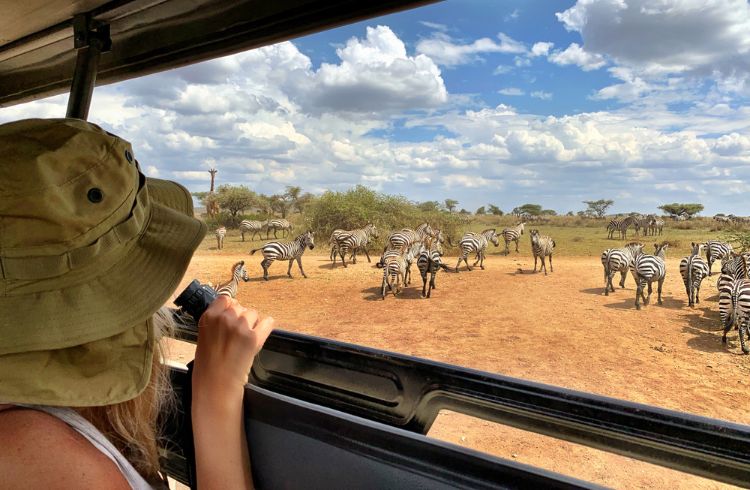
Employing local community members
In areas where tourism is the primary source of income, hiring locally is urgently important. This is especially true in regions such as Eastern Africa, where the alternative to sustainable safari employment could be poaching. When local communities are employed by safari companies, they witness first-hand how conservation-focused tourism can support the ecosystem and help sustain their own families. And while the safari industry is still male-dominated, Asilia’s Dunia Camp in the Serengeti is the first (and only) camp in Africa that’s entirely run by women, including the managers.
While many safari operators in Africa do employ local people, and some also have African-born leadership, it’s still fairly rare to find black-owned safari companies. Beks Ndlovu, the founder of African Bush Camps, is a black African who runs safari tours in Zambia, Botswana, and his native Zimbabwe. And while the color of Ndlovu’s skin may not matter to travelers, it’s important for his employees, who see him as a role model. Working for a successful safari founder and CEO that looks like them has been enormously motivating to his staff, many of whom now dream of starting their own safari companies because “If Beks can do it, maybe I can do it, too.”
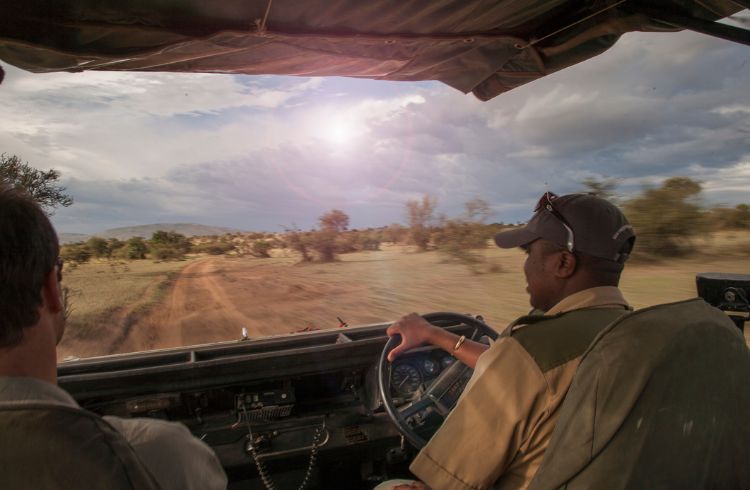
Expense vs affordability
Unfortunately, sustainably sourced and ethically produced products, services, and experiences are often more expensive, be it food, clothing, hotels, or safaris. For example, well-trained, highly experienced guides cost more than novice guides and it can be more difficult (and expensive) to source sustainable building materials. Electric vehicles (such as the electric safari jeeps that Asalia’s Bush Camp uses in Kenya) also cost more than gas-guzzling vehicles. All these factors push up the price of a safari because it’s just plain difficult and costly to transport and host people safely and comfortably in the middle of the bush, wilderness, and wildlife areas that often also charge steep (but necessary) conservation fees.
That said, just because a safari is expensive doesn’t mean it is ethical. That high price tag may be going to pay for on-the-ground luxuries such as 5-star tents, expansive lodges, and private plunge pools. Conversely, just because a safari is affordable doesn’t mean it’s unethical. Porini Camps is a great example of an ethical safari that is relatively affordable (several hundred dollars cheaper per night, depending on the season) and has been integral to habitat protection, community support, and employment in Kenya. It has trimmed away the high-end fat, so to speak, so accommodation is modest and electricity availability is minimal, which is also better for the environment. Its safari experience is focused on wildlife viewing and conservation, and their pricing structure is tied to habitat preservation, equating to the preservation of 700 acres, per tent, per night. And while solar power is becoming more popular at safari camps, Porini is a pioneer in the industry, having been 100% solar powered for 28 years.
Desert safaris
In many desert regions of the world like Jordan and Egypt, jeep safaris are a popular activity but the emphasis is typically on the thrill of racing jeeps through the sand at high speeds and stopping for travelers to climb sand dunes, sand surf, or scramble up rock formations. Desert camps that accommodate travelers on these jeep safaris, are a mixed bag of basic, eco-friendly camps, low-impact glamping, and higher-end luxury camps that offer amenities that are never sustainable in the desert, like swimming pools. When seeking out an eco-friendly desert camp, look to see how water is sourced, whether solar panels are used to power air-conditioning units, and if local communities are being employed at these camps.
At the Ammarin Bedouin Camp in Little Petra in Jordan, the Ammarin tribe has decided that this social enterprise will continue to only have a shared toilet and shower area instead of installing separate toilets and showers in every single tent. While the trend to provide more and more accommodations may provide additional comforts, the Ammarin tribe has decided to minimize the installation of plumbing in the desert, which can pose significant threats to the environment.
While many of these desert camps promote potentially problematic camel rides that should be avoided, many also offer guided hikes, evening stargazing excursions, or classes in traditional dance, carpet weaving, or instrument making. Having one-on-one interactions with the Bedouins leading these classes (and safari tours) offers an opportunity for cultural exchange and buying the teas, herbs, and crafts they sell are another way to help support local communities.
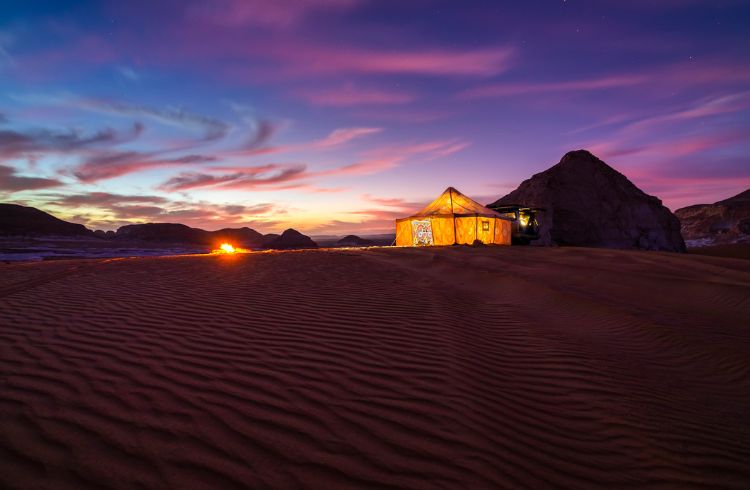
Related articles
Simple and flexible travel insurance
You can buy at home or while traveling, and claim online from anywhere in the world. With 150+ adventure activities covered and 24/7 emergency assistance.
Get a quote
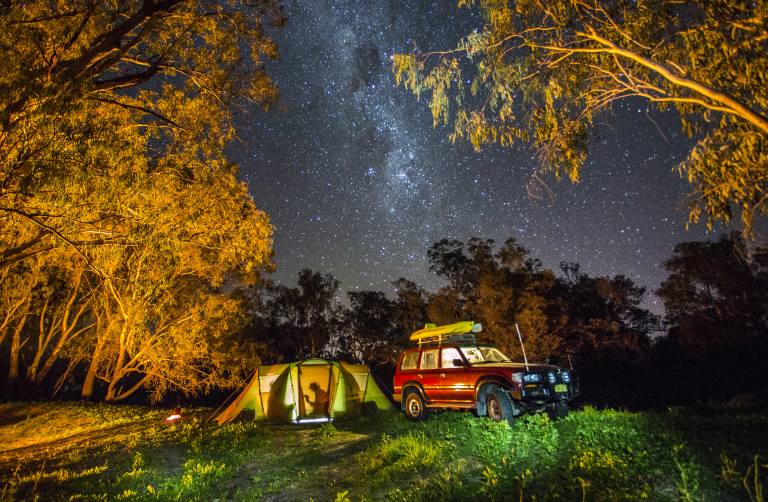
1 Comment
I have a sustainability question. There are many Safari parks in Australia, Europe. North America and Asia. Is it a better proposition to encourage tourists to go to them, rather than traveling extremely long distances to be in real world?